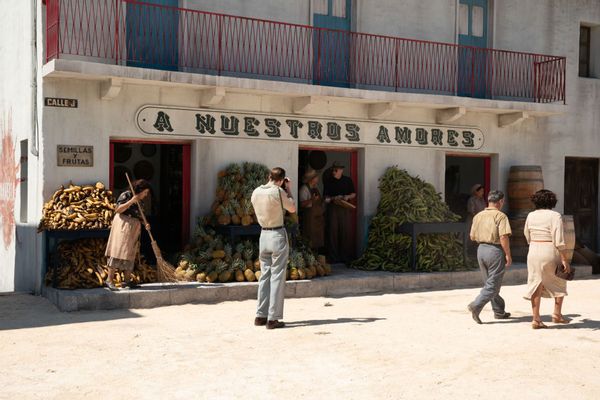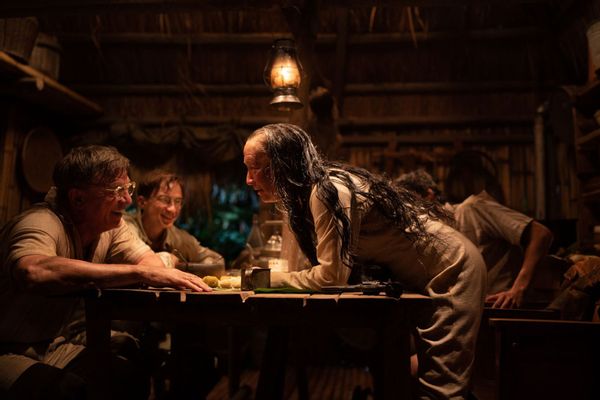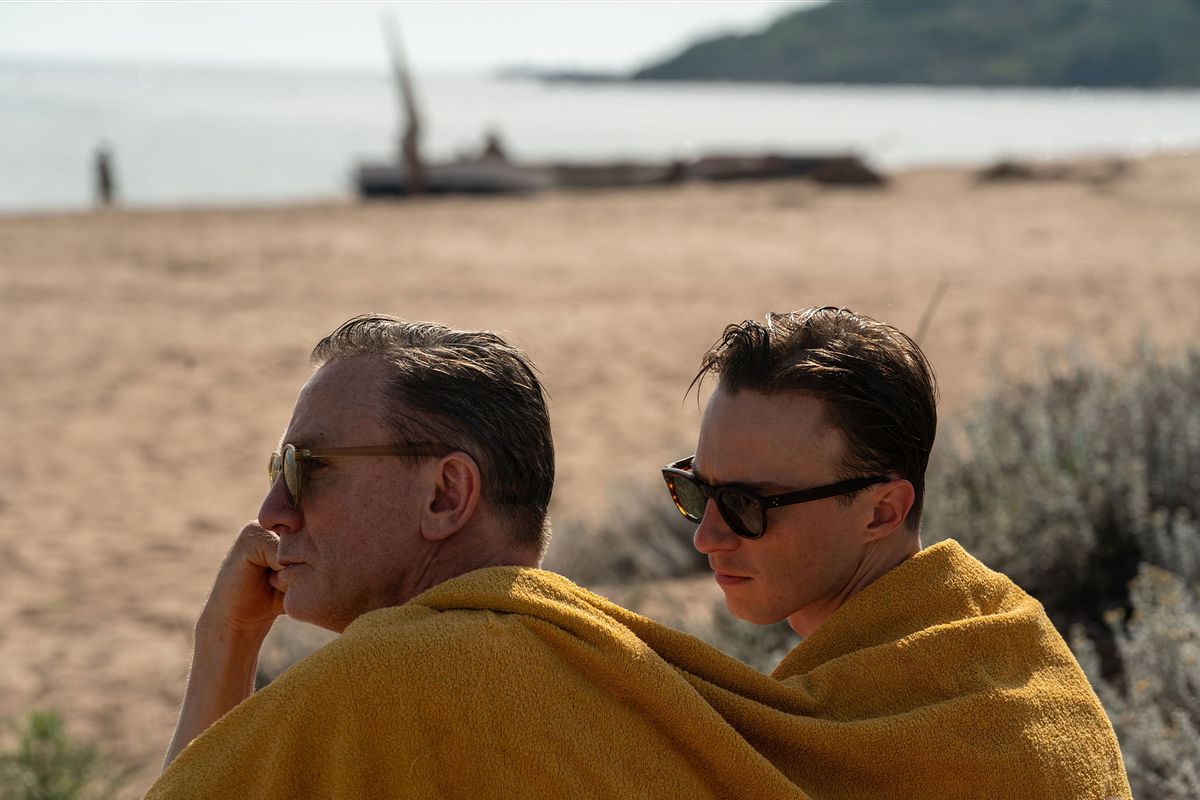Justin Kuritzkes has written only two feature films, both this year, both for director Luca Guadagnino, and both very gay films. First is “Challengers,” which was out in April, and now “Queer,” an adaptation of William S. Burroughs’ novel.
"Luca is a giant in queer cinema."
“Queer” depicts both the horniness of Lee (Daniel Craig) — Burroughs’ alter ego — as well as the haziness of his heroin addiction. Lee’s compulsions overlap when he meets Eugene Allerton (Drew Starkey) in 1950s Mexico. In Allerton, Lee finds someone he wants to have sex with and do drugs with. The film shows how the relationship between these two men develops over time. Although Lee does not hide his attraction for Allerton, which intensifies, when the men do have sex, it is messy, explicit, complicated and queer.
In an effort not to lose this handsome young man, Lee convinces Allerton to join him on a road trip through Latin America in search of yagé, a drug Lee craves. Eventually, they end up in the jungle with Doctor Cotter (Lesley Manville), tripping their balls off before things get more surreal.
Kuritzkes takes some liberties with the source material, but “Queer” succeeds in capturing both the spirit of Burroughs as Lee, and Craig honors the work by giving a fantastic, fully committed performance.
The writer spoke with Salon about adapting Burroughs, working with Guadagnino and making “Queer.”
What can you say about adapting Burroughs, which must have been a challenge?
This was the first time I ever adapted anything. Everything I had written prior to this, whether it was my plays, my novels or “Challengers,” was all original stuff. I was on the set for “Challengers,” and one day Luca just handed me this book and said, “Read this tonight and tell me if you will adapt it for me.” I read it that night and immediately said yes even though I had no idea, really, how I was going to make it into a film.
But, because I was in Boston with Luca making this other movie, we got to spend a lot of time talking about the vision of “Queer,” and the cinematic possibility of the book before I even started writing. For me, the first job I gave myself was being a good reader. I tried to pay attention to what was fundamental in the book so I could figure out what would be fundamental in the movie. Knowing Burroughs' work, through his other books “Naked Lunch” or “The Yagé Letters,” I had a preconceived notion of what the world of Burroughs was like, narratively. I was kind of shocked when I read “Queer,” to find that it was, for the most part, a fairly straightforward love story that operated on the level of psychology and in a fairly linear way. That was the drumbeat for the story.
 Queer (A24
Queer (A24
Had you read much of Burroughs' work before “Queer”?
I had, but I had not read this book. I was surprised when I read it that it felt like a real departure from the rest of his work. It feels like this is an outlier, but at the same time, it is like the most Burroughs book he wrote.
I know you are married to Celine Song (“Past Lives”), but let me ask you a question asked in the film: “Are you queer?” You have written two very queer films for Luca. Can you talk about your working relationship with him and making queer cinema?
On principle, my impulse is to say that is a dangerous question to ask and can put people in compromised positions. My impulse in one sense is to say, “It’s no one’s business what anybody’s private life is like.” On the other hand, I’m well aware that I’ve written two movies now for one of the most preeminent queer directors in cinema. Luca is a giant in queer cinema. And one of those movies is literally called “Queer,” so it doesn’t behoove anyone for me to be coy. I am straight and don’t claim any queer identity for myself. But at the end of the day, queer culture is culture, and in a movie like this, you focus on the parts of it that are universal. The specific milieu or situation or circumstances of the characters, you obviously have to consider and pay attention to and do research where you need to.
But what was happening psychologically between Lee and Allerton was something I had total access to through the sharpness of Burroughs' writing. On the level of feeling comfortable writing a movie like this, it was probably not a movie I would write out of the blue without a source or adapt it for anyone but Luca. But I saw my job as being a kind of medium between these two brilliant queer artists, one whom I knew well and knew as a collaborator, and one who I was never going to know because he is not around, and all I have is the stuff he left behind. I saw my job as opening a channel between these two people. That felt like a tremendous honor. This was a book that Luca read as a teenager and wanted to make for a long time. It felt like this tremendous responsibility to try to write Luca this movie he had been dreaming about.
The film builds tremendous sexual tension, as did your previous film this year, “Challengers.” How do you convey that homoeroticism on the page and then get it onto the screen? How explicit did you want to get?
The book is very coy in some sense about the intimate scenes between Lee and Allerton. When Luca and I were first discussing what the possibility of the movie could be, we were clear early on we did not want to be coy. That was not because of any sensational reason. It was because there was drama happening in the intimate scenes between Lee and Allerton. There was something being revealed about their character and their dynamic. In those intimate scenes, there is something at stake. Because of that, it is necessary action. It was important to me, as I was writing, that that it always be revealing of character and the shifting dynamics. I found myself having to be very specific in those scenes as I was writing them because I know I had to ask actors to be brave enough to perform it. If you are not brave enough to write it, why would you ask people to be brave enough to do it?
We need your help to stay independent
A middle section portrays the drug use and Lee being junk sick. What decisions did you make in how to present those moments?
It is all part of who this character is. It’s true of Burroughs that heroin was a part of his life for his entire life. The context of Lee being in Mexico is because being a drug addict in the U.S. makes him a criminal. It is why he ended up in Mexico. Drugs are the reason why Lee and Allerton met. They are sort of parallel facets of his character, rather than overlapping ones.
I think the language of addiction is present in the way Lee understands the language of intimacy. It felt necessary to treat that with a degree of frankness and see it objectively.
 Daniel Craig, Drew Starkey and Lesley Manville in "Queer" (A24)
Daniel Craig, Drew Starkey and Lesley Manville in "Queer" (A24)
The film shifts to a different tone as Lee and Allerton go into the jungle. Can you talk about those scenes and Doctor Cotter?
Doctor Cotter shows up towards the end of the book, but in the book, they get to Doctor Cotter’s hut and think they are going to get the yagé, but that possibility is closed, and they return to civilization not having gotten what they came for. When we first discussed what we could do for the movie, something that was exciting to both me and Luca was if you think of the book as opening the door and quickly closing it, we wanted to see what was on the other side, and have the characters actually step through and get what they were looking for. We wanted to see what that would do to their dynamic and how they would each deal with it. I know that the film was going to go there even as I was writing the earlier sections, which are more or less faithful to the book.
"The language of addiction is present in the way Lee understands the language of intimacy."
When it comes to the character of Doctor Cotter, I find her incredibly fascinating, and she got even deeper and richer when we cast Lesley Manville. I ended up writing more material for Doctor Cotter because I knew Lesley was doing it. It was exciting to think about her as a brilliant and crazed doctor living out in the jungle with her husband developing these medicines that she thinks are going to make her a millionaire. I was excited to watch Lesley do that. All the work that went into building that character is just so exquisite.
Finally, the film gets surrealistic and even incorporates the William Tell scene from Burroughs' own life. What can you say about the film’s imagery and symbolism?
That is part of what the film and what the book invites, is for people to think about all of that symbolism and internalize it and do what they will with it. A lot of it came from Burroughs and a lot of it came from Luca and his visual grammar that he wanted to bring to the movie, and that was stuff we talked about before I started writing. The visual language of centipedes throughout the film. That is all in Burroughs, but also in Luca’s mind. That kind of stuff was fun to thread through the script as we tried to build the symbolic vocabulary of the movie. Burroughs is full of all that stuff. He is a very evocative writer in that way.
“Queer” is now playing in select cities with nationwide expansion to follow
Read more
movie interviews by Gary Kramer



Shares